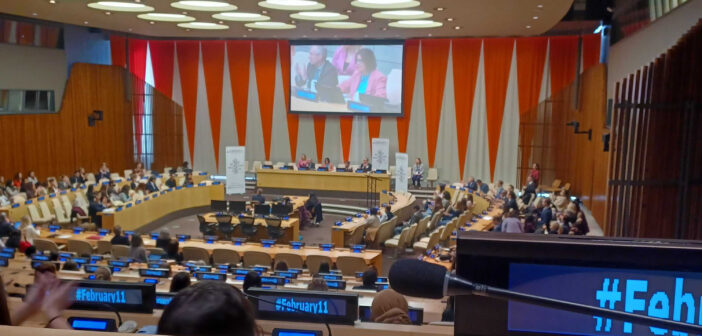The United Nations Partnership and the College of Engineering took 99 faculty, staff and students to the United Nations headquarters in New York City on Feb. 10 for the eighth annual International Day of Women and Girls in Science Assembly.
The theme of this year’s assembly was I.D.E.A.S., which stands for Innovate, Demonstrate, Elevate, Advance and Sustain. According to the day’s itinerary, it focused on “bringing communities forward for sustainable and equitable development” and on the U.N.’s Sustainable Development Goals.
According to the UN environment program website, Iraqi princess Nisreen El-Hashemite, founder of the Royal Academy of Science International Trust, created the International Day of Women and Girls in Science to promote gender inclusion across scientific fields.
Scientists, professors, economists and representatives from humanitarian programs across the world, including UNEP and UN-Habitat, attended the assembly. They discussed various aspects of the Sustainable Development Goals and how important women scientists are to achieving these goals.
The first of two panels was titled “Equipping Communities for Sustainable and Equitable Development,” and the second was titled “Bringing Everyone Forward.” The topics included sustainable cities, transportation, businesses, water systems and space exploration.
Two Lehigh professors were invited to speak at the assembly, including physics professor Virginia McSwain, who spoke about gender equity in astronomy. She discussed changes NASA has made to their proposal review system to make it more fair for women, such as taking a double-blind approach in order to get rid of gender bias, which resulted in more women getting their proposals passed.
McSwain said she is inspired by hearing from women in her field and was glad Lehigh students had the opportunity to participate.
“To hear from successful women scientists, that’s huge for young women,” McSwain said.
Gabrielle String, a civil and environmental engineering professor, also spoke at the assembly. The central focus of her speech was water safety plans, which aim to manage risks in water supply from the source to point-of-consumption.
In addition to the plans, String also spoke on how to achieve gender equity, something she believes may come by providing support and mentorship for upcoming women scientists.
String said it is important to not just encourage women and underrepresented minorities in STEM fields, but to have a support structure in place that helps keep all people in STEM.
“Figuring out new ways of doing work and flexibility around how we do work and who gets to make rules for success at every stage of the career is really important to be evaluated in order to see more women moving into a sort of long-term retention in STEM,” String said.
As an intern for the Lehigh University- United Nations partnership, Mackenzie Lynch, ‘23, recorded content for a podcast that explains the partnership between the U.N. and Lehigh University.
She said she has learned a lot about the U.N. in her classes and her experience as an intern relates to her work in the classroom.
“My major is international relations, so I’m pretty lucky that there’s a very big overlap with that, being that the partnership is with the U.N.,” Lynch said.
The importance of supporting and mentoring women in science was emphasized throughout the assembly.
Bioengineering professor Susan Perry attended the trip and said she encourages students to take advantage of the opportunities and support that are available to them.
“Science doesn’t sit in isolation, and neither should the scientists and engineers who practice it,” Perry said.






Comment policy
Comments posted to The Brown and White website are reviewed by a moderator before being approved. Incendiary speech or harassing language, including comments targeted at individuals, may be deemed unacceptable and not published. Spam and other soliciting will also be declined.
The Brown and White also reserves the right to not publish entirely anonymous comments.